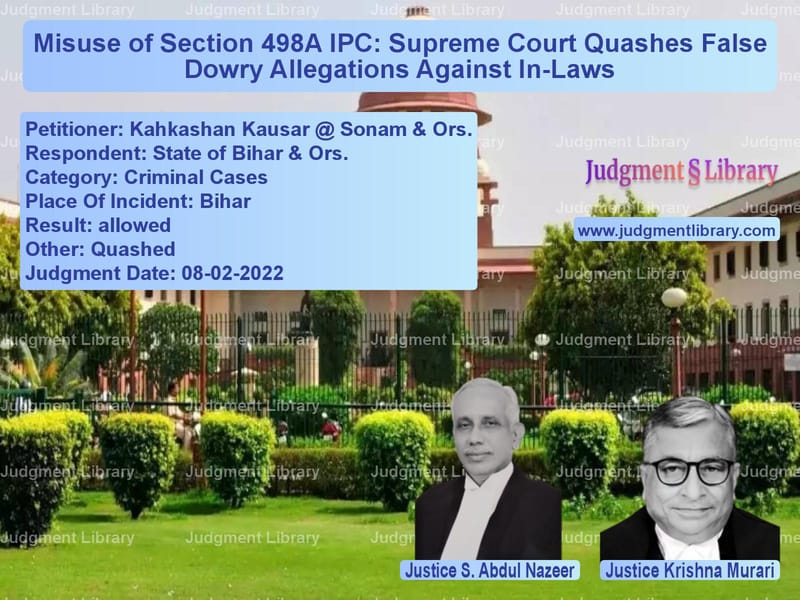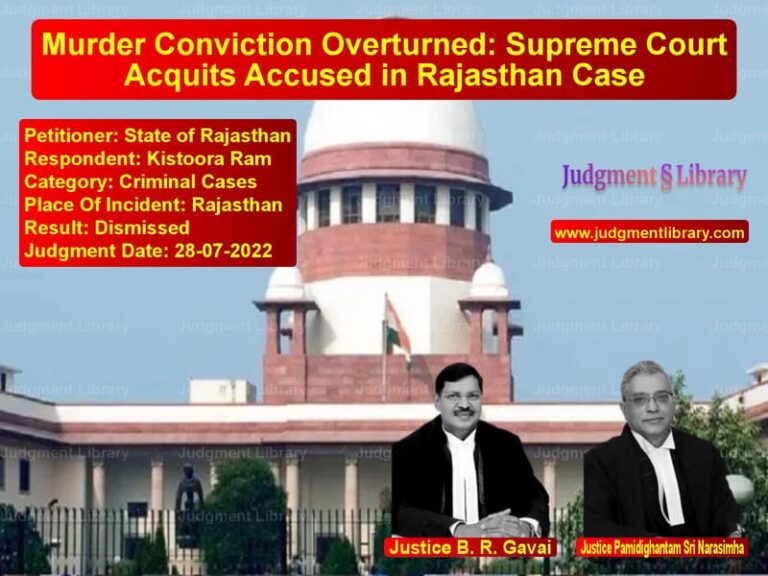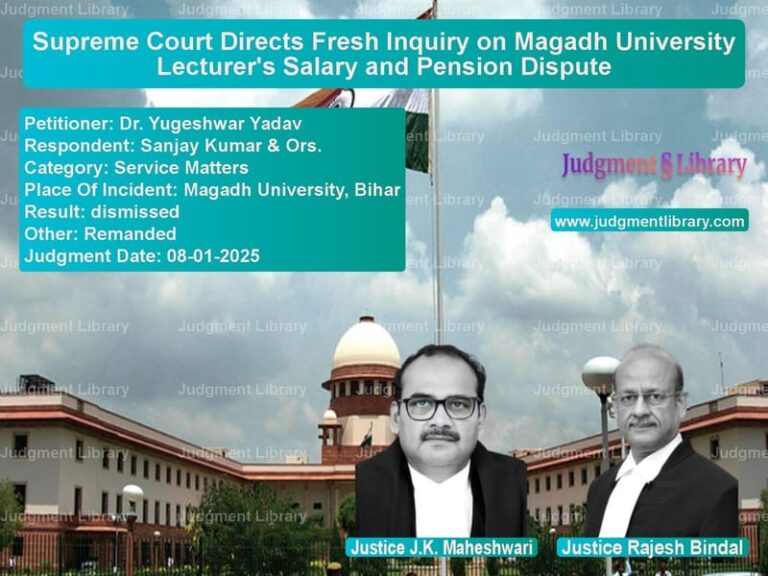Misuse of Section 498A IPC: Supreme Court Quashes False Dowry Allegations Against In-Laws
The case of Kahkashan Kausar @ Sonam & Ors. vs. State of Bihar & Ors. is a landmark judgment where the Supreme Court of India addressed the issue of false dowry harassment allegations under Section 498A IPC. The Court quashed the criminal proceedings against the in-laws of the complainant, recognizing that general and omnibus allegations cannot be used to implicate an entire family in a matrimonial dispute.
Background of the Case
The complainant, Tarannum Akhtar @ Soni, was married to Md. Ikram on September 18, 2017. She alleged that her husband and his family members had harassed her for dowry. Initially, she filed a criminal complaint in December 2017 before the Chief Judicial Magistrate, Purnea, alleging that her in-laws had demanded a car as dowry and had mistreated her.
Upon reviewing the evidence, the Sub Divisional Judicial Magistrate, Purnea, found no prima facie case against the in-laws and issued summons only against her husband under Section 498A and 323 IPC. The dispute was resolved, and she returned to her matrimonial home.
However, on April 1, 2019, she filed another complaint with similar allegations against her husband and in-laws, leading to the registration of FIR No. 248/2019 under Sections 341, 323, 379, 354, 498A read with Section 34 IPC. The husband and in-laws filed a petition before the Patna High Court seeking to quash the FIR, but the High Court dismissed their plea, stating that the case required police investigation.
Petitioners’ Arguments
The petitioners, who were the husband’s relatives, argued that:
- The allegations were vague, generalized, and aimed at harassing the in-laws.
- A similar complaint had already been dismissed in 2017.
- The police failed to conduct a preliminary inquiry before registering the FIR, as required by the judgment in Lalita Kumari vs. State of U.P.
- The complaint was filed with a revengeful intent to harass the in-laws and pressure them.
Respondents’ Arguments
The State of Bihar and the complainant countered that:
- The new FIR pertained to fresh incidents of harassment and dowry demands.
- The husband had earlier assured the court that he would treat his wife properly, but he and his family continued their dowry demands.
- The police had conducted an investigation and filed a charge sheet against all the accused, making it a fit case for trial.
Supreme Court’s Observations
The Supreme Court noted that Section 498A IPC was introduced to protect women from cruelty and dowry harassment, but the provision was increasingly being misused to implicate entire families in matrimonial disputes. The Court referred to past judgments, including:
- Rajesh Sharma & Ors. vs. State of U.P. – Highlighting that many complaints under Section 498A are filed in the heat of the moment over trivial issues.
- Arnesh Kumar vs. State of Bihar – Emphasizing that arrests in dowry cases should not be made mechanically.
- Preeti Gupta vs. State of Jharkhand – Recognizing that false allegations can cause undue hardship to the accused.
- Geeta Mehrotra vs. State of U.P. – Holding that in-laws should not be implicated in a dowry case without specific allegations.
Supreme Court’s Judgment
The Court quashed the criminal proceedings against the in-laws, stating:
“The allegations made against the appellants are general and omnibus in nature. No specific role has been attributed to any of them. If the criminal proceedings are allowed to continue, it would be nothing but an abuse of the process of law.”
The Court further ruled:
- Generalized allegations against in-laws are not sufficient to prosecute them.
- Allowing such cases to proceed would lead to harassment and mental trauma for innocent family members.
- The 2019 FIR was primarily aimed at dragging the in-laws into litigation without any substantial evidence.
Key Directives from the Judgment
- The Patna High Court’s order was set aside.
- FIR No. 248/2019 against the in-laws was quashed.
- The Supreme Court reaffirmed the need to prevent the misuse of Section 498A IPC.
Significance of the Judgment
This ruling has far-reaching implications:
- It protects in-laws from being falsely implicated in dowry harassment cases.
- It reaffirms the judiciary’s commitment to prevent the misuse of legal provisions.
- It discourages frivolous litigation that wastes judicial resources.
- It ensures that criminal law is not used as a tool for personal vendetta.
Conclusion
The Supreme Court’s judgment in Kahkashan Kausar @ Sonam & Ors. vs. State of Bihar & Ors. is a landmark ruling that safeguards families from baseless matrimonial disputes. The judgment reinforces that Section 498A IPC should be applied judiciously, ensuring that innocent family members are not dragged into unnecessary legal battles. This ruling sets a crucial precedent for future cases involving dowry harassment allegations.
Petitioner Name: Kahkashan Kausar @ Sonam & Ors..Respondent Name: State of Bihar & Ors..Judgment By: Justice S. Abdul Nazeer, Justice Krishna Murari.Place Of Incident: Bihar.Judgment Date: 08-02-2022.
Don’t miss out on the full details! Download the complete judgment in PDF format below and gain valuable insights instantly!
Download Judgment: kahkashan-kausar-@-s-vs-state-of-bihar-&-ors-supreme-court-of-india-judgment-dated-08-02-2022.pdf
Directly Download Judgment: Directly download this Judgment
See all petitions in Bail and Anticipatory Bail
See all petitions in Judgment by S. Abdul Nazeer
See all petitions in Judgment by Krishna Murari
See all petitions in allowed
See all petitions in Quashed
See all petitions in supreme court of India judgments February 2022
See all petitions in 2022 judgments
See all posts in Criminal Cases Category
See all allowed petitions in Criminal Cases Category
See all Dismissed petitions in Criminal Cases Category
See all partially allowed petitions in Criminal Cases Category







